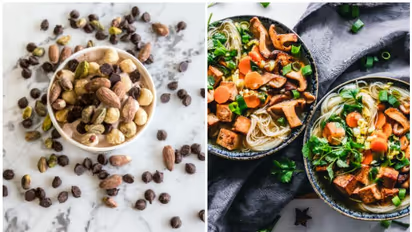Top 10 Vegetarian Protein sources for a balanced diet

Synopsis
Discover a variety of plant-based protein options that can support your vegetarian lifestyle. Explore nutrient-rich foods to meet your protein needs and maintain a well-rounded diet.
Protein, often referred to as the building block of life, is an essential nutrient that plays a crucial role in the body's growth, repair, and overall function. While many associate protein with animal products, there's a wide range of plant-based options that can provide ample protein for those following a vegetarian diet. Incorporating these sources into your meals can help you meet your protein needs and maintain a well-balanced diet. It's important to note that while plant-based protein sources are valuable, they may lack certain essential amino acids. However, by combining different protein sources throughout the day, you can easily obtain all the necessary amino acids your body needs.
Here are ten sources of vegetarian protein:
1. Legumes: Beans, lentils, and chickpeas are excellent sources of protein. They're versatile and can be added to soups, salads, and stews.
2. Tofu and Tempeh: Both tofu and tempeh are soy-based products that are rich in protein. They can be marinated and added to stir-fries or used as a meat substitute.
3. Quinoa: This ancient grain is a complete protein, containing all nine essential amino acids. It can be used as a base for salads, bowls, or as a side dish.
4. Seitan: Also known as wheat gluten, seitan is a high-protein meat substitute. It's often used in vegetarian and vegan dishes.
5. Nuts and Seeds: Almonds, peanuts, chia seeds, and pumpkin seeds are all good sources of protein. They can be added to smoothies, oatmeal, or eaten as snacks.
6. Greek Yogurt: Greek yogurt is higher in protein compared to regular yogurt. It can be eaten on its own, added to smoothies, or used as a topping.
7. Eggs: For lacto-vegetarians, eggs are a rich source of protein. They can be enjoyed in various ways, from boiled to scrambled.
8. Spinach: Leafy greens like spinach contain protein along with a host of other nutrients. Add spinach to salads, omelets, or smoothies.
9. Soy Milk: This plant-based milk alternative is fortified with protein and can be used in place of dairy milk in recipes.
10. Whole Grains: Brown rice, oats, and whole wheat products like bread and pasta provide a moderate amount of protein. They're also rich in fiber and other nutrients.
When planning your meals, consider creating a balanced plate with a mix of protein, complex carbohydrates, healthy fats, and plenty of vegetables. This approach not only ensures you're meeting your protein needs but also provides a well-rounded and nutritious diet. Whether you're vegetarian for ethical, health, or environmental reasons, the diverse range of protein sources available makes it possible to maintain optimal health and enjoy a variety of delicious meals.
Explore the latest Lifestyle News covering fashion, wellness, travel, Food and Recipes, and more. Stay updated with trending Health News, fitness tips, and expert insights to inspire your daily living. Discover personalized lifestyle trends that keep you stylish and informed. Download the Asianet News Official App from the Android Play Store and iPhone App Store for everything that adds value to your everyday life.